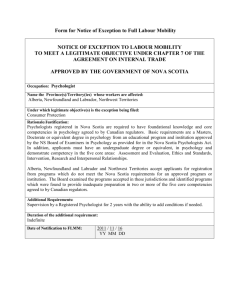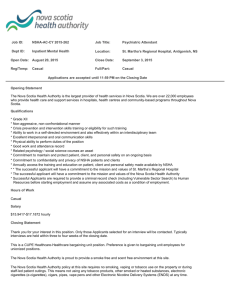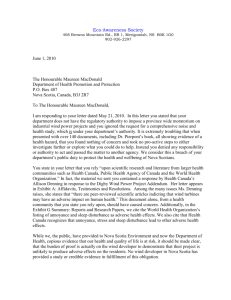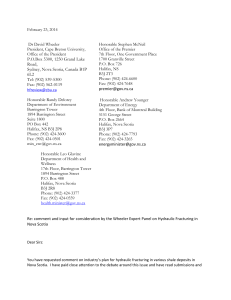Lorna Williamson
advertisement
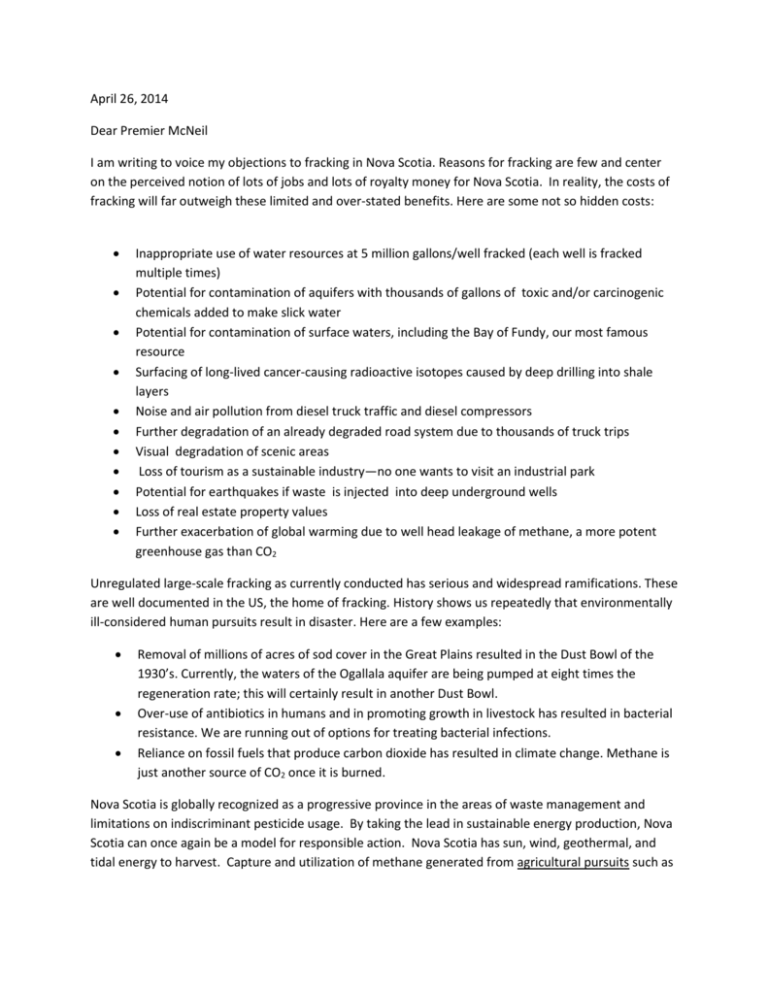
April 26, 2014 Dear Premier McNeil I am writing to voice my objections to fracking in Nova Scotia. Reasons for fracking are few and center on the perceived notion of lots of jobs and lots of royalty money for Nova Scotia. In reality, the costs of fracking will far outweigh these limited and over-stated benefits. Here are some not so hidden costs: Inappropriate use of water resources at 5 million gallons/well fracked (each well is fracked multiple times) Potential for contamination of aquifers with thousands of gallons of toxic and/or carcinogenic chemicals added to make slick water Potential for contamination of surface waters, including the Bay of Fundy, our most famous resource Surfacing of long-lived cancer-causing radioactive isotopes caused by deep drilling into shale layers Noise and air pollution from diesel truck traffic and diesel compressors Further degradation of an already degraded road system due to thousands of truck trips Visual degradation of scenic areas Loss of tourism as a sustainable industry—no one wants to visit an industrial park Potential for earthquakes if waste is injected into deep underground wells Loss of real estate property values Further exacerbation of global warming due to well head leakage of methane, a more potent greenhouse gas than CO2 Unregulated large-scale fracking as currently conducted has serious and widespread ramifications. These are well documented in the US, the home of fracking. History shows us repeatedly that environmentally ill-considered human pursuits result in disaster. Here are a few examples: Removal of millions of acres of sod cover in the Great Plains resulted in the Dust Bowl of the 1930’s. Currently, the waters of the Ogallala aquifer are being pumped at eight times the regeneration rate; this will certainly result in another Dust Bowl. Over-use of antibiotics in humans and in promoting growth in livestock has resulted in bacterial resistance. We are running out of options for treating bacterial infections. Reliance on fossil fuels that produce carbon dioxide has resulted in climate change. Methane is just another source of CO2 once it is burned. Nova Scotia is globally recognized as a progressive province in the areas of waste management and limitations on indiscriminant pesticide usage. By taking the lead in sustainable energy production, Nova Scotia can once again be a model for responsible action. Nova Scotia has sun, wind, geothermal, and tidal energy to harvest. Capture and utilization of methane generated from agricultural pursuits such as dairy and chicken farming is becoming more feasible and is gaining ground in the United States. We should promote energy conservation and award those who reduce their consumption. While reading my Citizenship Study Guide, I noted with pleasure that one the Citizenship Responsibilities is “Protecting and enjoying our heritage and environment—Every citizen has a role to play in avoiding waste and pollution while protecting Canada’s natural, cultural and architectural heritage for future generations. “ The citizens of Nova Scotia and Canada can only be successful in this responsibility if their elected officials also believe this and act responsibly. Future generations will thank us for being mindful of their well-being while preserving the unique qualities of Nova Scotia. Please continue the fracking moratorium. Sincerely, Lorna J Williamson, PhD Cc: Hydraulic Fracking Review Keith Irving, MLA South Kings Andrew Younger, Energy Minister Randy Delorey, Environment Minister

